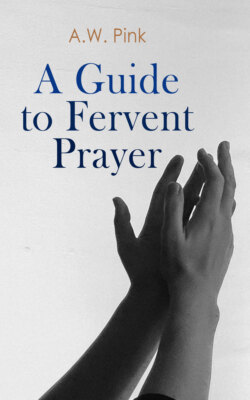Читать книгу A Guide to Fervent Prayer - A.W. Pink - Страница 6
На сайте Литреса книга снята с продажи.
The Wide Spectrum of Prayer
ОглавлениеBefore proceeding further it should be pointed out that in this series of studies I do not propose to confine myself to the petitionary prayers of the apostles, but rather to take in a wider range. In Scripture prayer includes much more than merely making known our requests to God. We need to be reminded of this. Moreover, we believers need to be instructed in all aspects of prayer in an age characterized by superficiality and ignorance of God-revealed religion. A key Scripture that presents to us the privilege of spreading our needs before the Lord emphasizes this very thing: "Be careful for nothing; but in every thing by prayer and supplication with thanksgiving let your requests be made known unto God" (Phil. 4:6, ital. mine). Unless we express gratitude for mercies already received and give thanks to our Father for His granting us the continued favor of petitioning Him, how can we expect to obtain His ear and thus to receive answers of peace? Yet prayer, in its highest and fullest sense, rises above thanksgiving for gifts vouchsafed: the heart is drawn out in contemplating the Giver Himself, so that the soul is prostrated before Him in worship and adoration.
Though we ought not to digress from our immediate theme and enter into the subject of prayer in general, yet it should be pointed out that there is still another aspect that ought to take precedence over thanksgiving and petition, namely self-abhorrence and confession of our own unworthiness and sinfulness. The soul must solemnly remind itself of Who it is that is to be approached, even the Most High, before whom the very seraphim veil their faces (Isa. 6:2). Though Divine grace has made the Christian a son, nevertheless he is still a creature, and as such at an infinite and inconceivable distance below the Creator. It is only fitting that he should deeply feel this distance between himself and his Creator and acknowledge it by taking his place in the dust before God. Moreover, we need to remember what we are by nature: not merely creatures, but sinful creatures. Thus there needs to be both a sense and an owning of this as we bow before the Holy One. Only in this way can we, with any meaning and reality, plead the mediation and merits of Christ as the ground of our approach.
Thus, broadly speaking, prayer includes confession of sin, petitions for the supply of our needs, and the homage of our hearts to the Giver Himself. Or, we may say that prayer’s principal branches are humiliation, supplication, and adoration.
Hence we hope to embrace within the scope of this series not only passages like Ephesians 1:16-19 and 3:14-21, but also single verses such as 2 Corinthians 1:3 and Ephesians 1:3. That the clause "blessed be God" is itself a form of prayer is clear from Psalm 100:4: "Enter into his gates with thanksgiving, and into his courts with praise: be thankful unto him, and bless his name." Other references might be given, but let this suffice. The incense that was offered in the tabernacle and temple consisted of various spices compounded together (Exod. 30:34, 35), and it was the blending of one with another that made the perfume so fragrant and refreshing. The incense was a type of the intercession of our great High Priest (Rev. 8:3, 4) and of the prayers of saints (Mal. 1:11). In like manner there should be a proportioned mingling of humiliation, supplication, and adoration in our approaches to the throne of grace, not one to the exclusion of the others, but a blending of all of them together.
